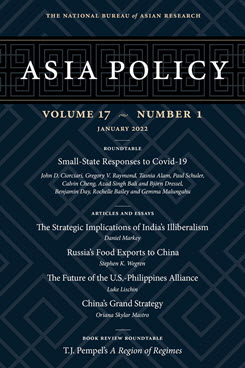The Future of the U.S.-Philippines Alliance
Declining Democracy and Prospects for U.S.-Philippines Relations after Duterte
This article examines the Philippines’ democracy under the administration of President Rodrigo Duterte and assesses the ramifications of democratic decline for the future of the U.S.-Philippines alliance under the next administration.
EXECUTIVE SUMMARY
MAIN ARGUMENT
The anti-democratic policies of the Duterte administration have subverted institutional and societal checks on executive power, threatening the U.S.-Philippines alliance as an instrument of U.S. strategy in the Indo-Pacific. Duterte successfully reshaped domestic politics to augment his regime’s influence over the legislature, judiciary, local governments, military, and economy, and openly sought to jettison the alliance for closer diplomatic and economic ties with China that would help him subvert domestic checks and balances on his administration. To repair and augment its alliance with the Philippines, the U.S. must recognize that the country’s democratic decline is highly unlikely to reverse once Duterte leaves office and should transparently develop policies to incentivize the next administration and policymakers in the Philippines to roll back Duterte’s anti-democratic policies.
POLICY IMPLICATIONS
- If Duterte’s successor continues to consolidate power domestically by weakening institutional checks on the administration’s authority and coercing political opposition into silence or compliance, military cooperation between the U.S. and the Philippines will falter and create new vulnerabilities threatening U.S. interests in the Pacific region.
- The Biden administration should reconfigure U.S. security assistance under the schema of positive conditionality to discourage further efforts to undermine democratic governance and degrade human rights conditions from the next presidential administration in the Philippines. U.S. assistance should also be optimized to support the Philippines’ military modernization while prioritizing economic and technical cooperation to mitigate the challenges imposed by the Covid-19 pandemic, economic recession, and pervasive low-intensity conflict.
- Whereas the application of sanctions on individuals responsible for supporting human rights violations can be a coercive tool of diplomacy in extremis, it is more important that the U.S. offer inducements for curtailing these violations through bilateral efforts to expand investments from U.S. companies to Philippine business, particularly through the U.S. International Development Finance Corporation and the Millennium Challenge Corporation.
Luke Lischin is an Assistant Research Fellow at the National War College in Washington, D.C. (United States), and an independent consultant on political violence in Southeast Asia.
Note: The opinions expressed in this article are the author’s own and do not necessarily reflect the views of the National War College.
About Asia Policy
Asia Policy is a peer-reviewed scholarly journal presenting policy-relevant academic research on the Asia-Pacific that draws clear and concise conclusions useful to today’s policymakers. Asia Policy is published quarterly in January, April, July, and October and accepts submissions on a rolling basis. Learn more


